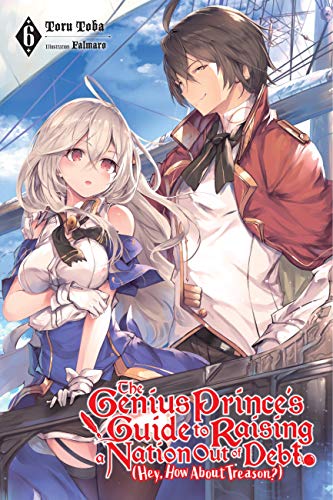By Toru Taba and Falmaro. Released in Japan as “Tensai Ouji no Akaji Kokka Saisei Jutsu ~Sou da, Baikoku Shiyou~” by GA Bunko. Released in North America by Yen On. Translated by Jessica Lange.
We’ve always had the backstory of “the college years” simmering through this series, even if we’ve never had an entire book dedicated to it. We get the odd flashback, such as in this volume. First there was Wein and Ninym. Then, gradually, they added Strang, Glen, and Lowellmina. And the five of them pretty much shook the world as a team. Now each of them is deeply caught up in political intrigue as an adult. Wein and Ninym theoretically have it easier. They’re not from the Empire. They don’t have to participate in this throne war the way the other three do. But of course they really do, and in fact Wein and Ninym have been dragged into it since it began. It’s a proxy war. A war to se which of the five is truly the best, the top strategist, leader, and person. Wein is, frankly, looking down from on top of the pile. He’s the protagonist. But this book suggests it may not last forever.
The battle for the Empire has been going on since the start of the series, and it’s finally reaching its climax. Each of the three candidates for Emperor are making their moves. Lowellmina is dealing with assassination attempts, Strang is trying to show Wein that standing back and doing nothing is going to do nothing but drag his own nation into a war, and Glen is just trying to do his best as a soldier while his boss runs amuck with the largest army. There’s Levetia, which is secretly backing one of the princes basically for the lulz. There’s Eastern Levetia, which just want to have a nice word with Prince Wein but get dragged into the conflict anyway. There’s Falanya, who is cognizant that forces are trying to overthrow her brother and put her in power, but is not sure she wants it. And there’s the Flahm, who are desperate for a beacon of hope to guide them, and may end up being the final stake in Wein’s heart before all this is over.
I admit I was faked out a bit by the author. When Strang asks Ninym if she’s ever wanted to go up against Wein, it feels like a big moment, one that will pay off with her willing betrayal. But that reckons without the fact that she and Wein are joined at the hip, as well as in (unspoken) love, and while it is an intriguing idea (we have not gotten nearly enough of Ninym as a strategist on her own in this series, as opposed to Wein’s sounding board), it’s not something she can do of her own volition. That’s why the cliffhanger for the book is so important. This is the sort of thing that could break the two apart permanently, and I don’t think either of them could stand that. This series is too lighthearted to end by killing off its two leads, but, as I’ve said since the start, I would not be surprised if it ends with Wein “winning” by heading off with Ninym to some quiet place where he can not be a ruler.
The 12th book isn’t scheduled yet, so I’m not sure when we’ll see what happens next. At least the giant throne war is over. For now.










